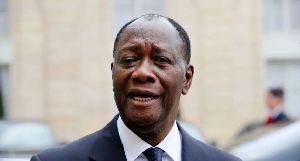Accra, May 26, GNA - Panelists and participants at a National Conference on Managing Foot Soldiers, on Wednesday condemned the sluggishness and ineptitude of the security agencies in managing foot soldiers agitations and violent actions across the country. "The police administration's seeing nothing, hearing nothing and saying nothing about the attitude of police personnel towards recent foot soldier agitations, take-over and violent actions is a tacit endorsement of the culture of defiant by activists of the ruling National Democratic Congress (NDC).
"The actions of the foot soldiers are an attack on the state and dangerous to the democratic dispensation, which must be dealt with according to the laws of the land," the panelists noted at the conference organised by the management of the Centre for Freedom and Accuracy (CFA), a civil society advocacy group in Accra. The Conference was on the theme: "Managing Foot Soldiers and Party Loyalists for a Sustainable Democracy and Effective Institutional Development".
It was chaired by Nana Susubribri Krobea Asante, Paramount Chief of Asante-Asokore in the Ashanti Region. The panelists challenged the Inspector General of Police and the Police Administration to adhere to the Police Service Act, 1970 [Act 350]; which mandated it to crime detection and prevention; apprehension (arrest) and prosecution of offenders; maintenance of law and order; and due enforcement of the law. Professor Kenneth Agyeman Attafuah, a Criminologist described foot soldiers as people, who possessed strong anti-establishment ethos, with a sense of "outsiderism," even within their parties and exist outside the mainstream of society. He said they used violence and aggression to expel appointed leaders, lock-out elected officials, influence the dismissal of political office holders, and generate a cocktail of confusing and contradictory responses to their actions from political party leaderships and drive government public relations into denying their impact on government appointments. Prof. Attafuah said recent foot soldier activities highlight the youth's complete loss of faith in mainstream national institutions and legal frameworks for governance.
"It is akin to the public's loss of faith in the administration of justice, which fuels reliance on self-help policing, resort to instant, besieging court rooms and attacking judges.
"Their behaviours typify covetousness, a focus on materialism, cupidity and acquisitiveness and self-enrichment in a sense, the term foot soldier evokes images of mercenaries," Prof Attafuah noted. Prof Attafuah identified three main principles underpinning the militant and strident agitations and expectations of contemporary foot soldiers, which included profit and pleasure - reaping the economic dividends of political power "It is a caricatured interpretation of Dr Kwame Nkrumah's words, 'seek ye the political kingdom first, and the rest shall be added unto you," he said.
The other principles were anti-corruption - demand for accountability and transparency by public office holders both past and present, in the character of the slogan of yester-years."we no go sit down make them cheat us every day," and demand for justice - vengeance against implacable political enemies.
On how to deal with the foot soldiers phenomenon, Prof Attafuah urged the political heads to find novel and effective ways of engaging with the agitated youths and getting them to accept and promote the broader and deeper notions of patriotism, justice and equality for all, fairness in the sharing of the proverbial national cake.
Other suggestions included training of foot soldiers in efficient and effective ways of ensuring administrative justice by public officials, lobbying and advocacy skills, preventing, managing and resolving conflict. He said political parties must also promote the concept of leadership for service not avarice, adhere to justice across board over cyclical vengeance and ensure transparency in public procurement procedures. The conference was attended by people academia, political party representatives, foot soldiers, students, democratic institutions and media personnel.
General News of Wednesday, 26 May 2010
Source: GNA












